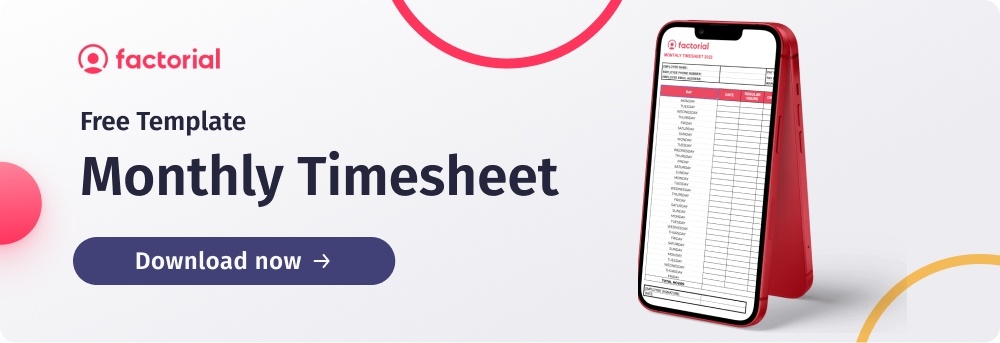Time off in lieu (TOIL) is a term used for when an employee has worked extra hours and instead of accepting overtime pay, they take extra time off. In the modern workplace, changing timetable patterns are commonplace, and employers actively encourage a flexible working environment. Therefore, time off in lieu is a useful bargaining tool in negotiations about working additional hours and overtime pay.
TOIL has become a widespread solution for managing overtime in the workplace. Once you have decided that adopting a time off in lieu policy is a suitable solution for handling overtime, you’ll need to start thinking about a TOIL policy that covers overtime regulations and record-keeping.
In this article, we’ll explore all of this in detail.
Table of Contents
What is Time Off In Lieu?
Time off in lieu refers to the paid time-off employees receive ‘instead of’ getting paid for additional hours worked above their regular contracted working week. In this way, it can be seen as an added time off on top of the holiday days included in an employee’s contract. This could be additional hours on top of a usual day or working a bank holiday, typically called an ‘alternative holiday’.
TOIL vs Paid Overtime
Which is better, time taken in lieu or paid overtime? Choosing TOIL is generally considered more advantageous for the employer. When a company doesn’t have to pay overtime rates (i.e. standard hourly rate, time and a half, or even double time), costs are lowered.
Time Off In Lieu and UK Law
According to UK law, employers are not required to pay their employees overtime as long as the average pay for total hours worked doesn’t fall below the National Minimum Wage. Not paying for overtime is legal as long as employees are not forced into working extra hours against their will with no compensation, either financially or in the form of TOIL. However, rewarding workers when they have worked overtime is generally considered good professional practice. According to the government website, you must agree to the terms with your employer.
There are, however, very strict legal restrictions on how many hours employees can work. Under the UK Working Time Regulations, workers cannot work more than 48 hours extra without a written opt-out agreement. This is also true of the EU’s Working Regulations.

How Do You Calculate Time Off In Lieu?
Recording a day in lieu
During busy periods, employees commonly work overtime to meet deadlines. When this happens, employers implement a time in lieu record Excel sheet, timesheets, or a time logging system using HR software. These methods of time tracking all ensure that extra time is accurately recorded.
Administering TOIL
Once a clear system of recording overtime is in place, the amount of TOIL to be issued is easily calculated. For example, if an employee was contracted for three days a week but worked five days one week, they would be entitled to two days off in lieu. Or, if they were contracted for 40 hours per week and worked 50 hours, they could take 10 hours off in lieu.
In this way, every hour worked on top of the contract is banked time that the worker can claim as holiday requests and time off.

Creating a Time Off In Lieu Policy
Making a general company policy for time off in lieu is relatively straightforward. First and foremost, it is extremely important that a signed written agreement between employer and employee is completed. Both parties must agree that TOIL will be offered for extra hours worked outside of the worker’s contract.
In the written policy, it is a good idea to include the following:
- A clause clearly stipulates how much TOIL an employee can accumulate (per month or year).
- When they are permitted to take their additional days in lieu and any blocked periods.
- The cut-off date, i.e. until when their days are valid.
- In which circumstances employees get time off rather than being paid for overtime (if it varies).
- How employees should record extra hours worked.
- How time off in lieu is handled if they have banked additional days when they leave the job.
Adding in the above details ensures the employees won’t accumulate too many days off at once. Employees are responsible for recording their overtime on the company’s time tracking system. The manager’s responsibility lies in keeping track of time in lieu requests.
Setting a cut-off date
To better manage extra holiday days, it’s best that you outline the deadline for when extra time off must be taken in your lieu policy. A system like this helps avoid employees banking up too many hours. The problem with excessive banked hours is that if employees decide to take all of them at once, the cover is required, which can add extra strain on the team.
A suggestion for a cut-off date could be the end of the financial, tax, annual leave or calendar year. However, some employers specify that TOIL must be taken the month directly after it was accumulated. This choice is clearly one for the employer to make and should be based on the employer’s business conditions.
Limiting TOIL during busy periods
Limiting time off in lieu during a company’s busiest seasons will help prevent understaffing in these hectic periods. It is important for managers to be aware of times of high business volume, so they can plan accordingly and ensure they are sufficiently staffed. During these times, many companies restrict the amount of TOIL that can be taken.
Employees abusing TOIL
Additional paid time off work is an attractive idea to most of the workforce, meaning workers sometimes feel encouraged to work more than their regular contracted hours or skip their lunch breaks to bank up as much overtime as possible. Therefore, it is essential that employers control this process by clearly stating the parameters of overtime. Ensuring any overtime activity is authorised by line managers is also vitally important.

How Do I Request Time Off In Lieu?
The easiest way to manage time off in lieu is by using HR software to automate and streamline time off management. If this isn’t possible at your company, you can instead give a written letter asking for permission. Below is a request or agreement template you can use.
Time Off In Lieu Request Template
Dear [Manager Name],
I have recorded [x] hours of additional work over the course of [period of time] which I would like to use for time off in lieu.
The days I have banked and the timing of this request meet the criteria for TOIL stated in [my contract/our TOIL policy]. As a result, I am requesting [x hours/days] of TOIL to be taken [insert dates of time off]. Once this time off in lieu has been used, there will be [x hours/days] of TOIL remaining for me to take.
Thank you in advance.
Kind regards,
[Employee name]
Benefits of Time Off In Lieu
Offering employees TOIL has many advantages for employers and employees, including:
1. Gives the most valuable commodity, i.e. time
Bonuses are much appreciated, of course, but often time is valued above financial compensation. This is especially true for higher-paying roles as employees in these positions are more likely to be cash-rich but time-poor.
2. Keeps costs under control
From an employer’s perspective, time off in lieu also offers advantages. It can serve as a cost-effective alternative to overtime pay, especially in situations where financial constraints may prevent providing additional compensation. TOIL allows organisations to manage their resources effectively by leveraging the accrued extra hours to cover workload fluctuations or time-sensitive projects without incurring excessive expenses.
3. Promote Work-Life Balance
Time off in lieu promotes work-life balance. In today’s fast-paced and demanding work environments, achieving a healthy equilibrium between professional and personal life is crucial. TOIL allows employees to accumulate additional hours, converting them into valuable time away from work. This flexibility enables individuals to attend to personal matters, spend quality time with loved ones, engage in hobbies, or simply recharge their batteries. By allowing employees to balance their work commitments with personal responsibilities, TOIL contributes to increased job satisfaction and overall well-being.
4. Boosts Productivity
Time off in lieu fosters motivation and productivity in the workplace. Employees are likely to feel more motivated to go the extra mile when necessary because their extra efforts will be acknowledged and rewarded with additional time off. Plus, having time away from work can improve performance; according to Researcher Mark Rosekind, taking annual leave can increase performance by 80%.
Commonly Asked Questions About TOIL
What is the meaning of time off lieu?
Time off in lieu (TOIL) is a term used for when an employee has worked extra hours and, instead of accepting overtime pay, they take extra time off.
How do you use day off in lieu in a sentence?
“I worked on Saturday, so I’m taking a day off in lieu on Monday.”
Can employees be paid in lieu of taking holiday?
Yes, employees can be paid instead of taking their holiday if agreed upon previously with their employer.
What is the meaning of time off from work?
Time off from work refers to a period when an employee is not required to be present or perform work-related tasks.
Why is it called time in lieu?
It is called time in lieu because it refers to the time taken off in exchange for working extra hours beyond the regular schedule.
What does lieu stand for?
Lieu stands for “instead” or “in place of” in French.
What are the advantages of time off in lieu?
The advantages of time off in lieu include promoting work-life balance, boosting motivation and productivity, cost-effectiveness for employers, and aiding recruitment and retention efforts. It stops employees from becoming overworked and supports mental health and work life balance
What is the difference between toil and flexi-time?
TOIL (Time off in lieu) refers to the exchange of extra worked hours for compensated time off, while flexi time refers to a flexible work schedule where employees have control over their start and finish times within certain limits.
How does unpaid leave work?
Unpaid leave is a period when an employee takes time off from work without receiving a salary or wages.
Do I get a day in lieu for bank holidays?
Whether you get a day in lieu for bank holidays depends on your employer’s policies and employment contract. It is legal to give time off in lieu for bank holidays.
Is TOIL taxable?
Getting days in lieu means extra paid holiday days; therefore, TOIL is taxable. However, it won’t cause your tax bill to increase as you’ll receive extra days off and your regular salary. It’s important to note that the tax implications of TOIL vary depending on the jurisdiction and specific regulations. It is advisable to consult tax professionals or relevant authorities for accurate information.
What is reasonable overtime UK?
Reasonable overtime in the UK refers to additional hours worked beyond the standard working hours, typically subject to agreed-upon limits, rates, and legal requirements.
Does overtime count towards holiday accrual?
Whether working overtime counts towards holiday accrual depends on the company’s policies and employment agreements.
How do you record time in lieu?
Recording time in lieu typically involves documenting the extra hours worked and the corresponding time off earned in the organisation’s time tracking system or through a mutually agreed-upon process.
What is an example of TOIL?
An example of TOIL is when an employee works on a weekend and accumulates extra hours that can be taken off as additional vacation time in the future.







